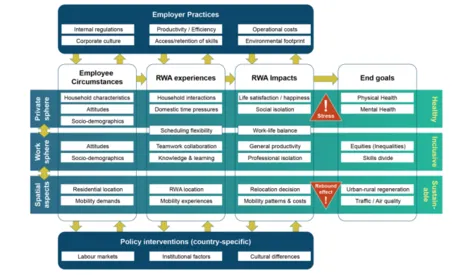WinWin4WorkLife
Transport and Epidemic Networks: Graphs, Optimization and Simulation
WinWin4WorkLife aims to deepen an interdisciplinary understanding of remote work's social, economic, and spatial implications, to increase knowledge and to design evidence-based policies to navigate the changing world of remote working in Europe. Against the shifting landscape of work dynamics post-COVID-19, the project aims to shed light on the complexities of remote work arrangements (RWA) by bringing together insights from employers and employees.
Focused strategically on five European countries – Germany, Finland, Luxembourg, Portugal and Slovakia – WinWin4WorkLife will carefully collect data in this data-driven investigation. The five case studies encompass different social systems, housing and labor markers, and different cultural contexts, seeking to unveil the multifaceted dimensions of telework.
WinWin4WorkLife will create typologies to describe the diverse spectrum of adoption of RWA by employers and employees. By considering factors such as urban-rural dynamics, skills shortages, health indicators, and digital literacy, we will provide differentiated perspectives crucial for informed policy design.
A core part of the project is enhancing spatial forecasting models to account for the impact of RWA on household and workplace relocation, traffic, emissions and transport-related health. The models will cover urban, rural, regional and cross-border areas, providing invaluable insights into the potential spatial and environmental impacts of different RWA scenarios. This insight will enable policymakers, researchers, and communities to examine policy pathways to reach the desirable alternative futures accounting for the evolving landscape of remote working.
Driven by a consortium of 15 European partners, WinWin4WorkLife represents a collaborative effort to promote harmonious balance in RWA. This project is led by the Luxembourg Institute for Socio-Economic Research (LISER).
TUM leads workpackage 6, on forecasting RWA's spatial and environmental impacts. Specifically, we will enhance our integrated land use/transport model SILO-MITO-MATSim to fully reflect the impacts of RWA on household and employment relocation, transport and transport-related health and environmental impacts. TUM will implement the modeling suite in Munich, South Savo (Finland) and Lisbon (Portugal) and support the aggregate analysis in Luxembourg and Slovakia. The main outcomes will be compiled to show differences between the business-as-usual projection and RWA policy scenarios.
| Keywords | Remote work, telework, working arrangements, digital nomads, land use, transport, emissions, health |
| Funding | European Commission (HORIZON-CL2-2023-TRANSFORMATIONS-01-01) |
| Partners | Luxembourg Institute of Socio-Economic Research (LU), Euroquality SAS (FR), Vrije Universiteit Brussel (BE), hbits (BE), Astiki Mi Kerdoskopiki Etaireia Proliptikis Perivallontikis Kai Ergasiakis Iatrikis (EL), Komiteen for Undhedsoplysning (DK), IST-ID (Associação do Instituto Superior Técnico para a Investigação e Desenvolvimento, PT), Technische Universität München (DE), Leibniz-Zentrum für Europäische Wirtschaftsforschung (DE), Universidad Politécnica de Madrid (ES), Žilinská univerzita v Žiline (SK), Helsingin yliopisto (FI), Universiteit Maastricht (NL), TREXIMA Bratislava, spol. s r.o. (SK), École Polytechnique Fédérale de Lausanne (CH) |
| Duration | February 2024 - August 2027 |
| Contact | Rolf Moeckel, Ana Moreno |
| News | https://www.linkedin.com/company/winwin4worklife-eu-project/ |

